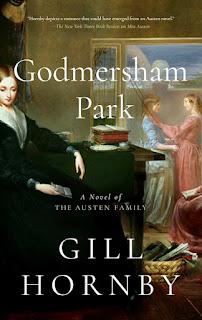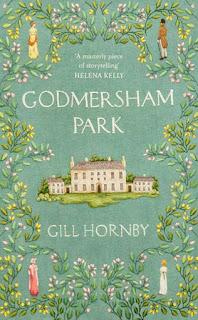

I am so excited to kick off an exceptional historical fiction novel blog tour here at My Jane Austen Book Club! Godmersham Park by Gill Hornby is a story based on actual events, people, and locations in Jane Austen’s life, which takes place at the grand country estate of Jane’s wealthy brother Edward and his large family.
To discover more about it, please read my interview with author Gill Hornby and, then, feel
free to leave your comments here and spread the good news!
A new Regency-era biographical fiction novel
from a bestselling author of Miss Austen
GODMERSHAM PARK:
A Novel of the Austen Family
by Gill Hornby
Genre: Historical Fiction, Austenesque, Historical Biographical Fiction
BOOK DESCRIPTION
On January 21, 1804, Anne Sharpe arrives at Godmersham Park in Kent to take up the position of governess. At thirty-one years old, she has no previous experience of either teaching or fine country houses. Her mother has died, and she has nowhere else to go. Anne is left with no choice. For her new charge—twelve-year-old Fanny Austen—Anne's arrival is all novelty and excitement.
The governess role is a uniquely awkward one. Anne is neither one of the servants, nor one of the family, and to balance a position between the "upstairs" and "downstairs" members of the household is a diplomatic chess game. One wrong move may result in instant dismissal. Anne knows that she must never let down her guard.
When Mr. Edward Austen's family comes to stay, Anne forms an immediate attachment to Jane. They write plays together and enjoy long discussions. However, in the process, Anne reveals herself as not merely pretty, charming, and competent; she is clever too. Even her sleepy, complacent, mistress can hardly fail to notice.
Meanwhile Jane's brother, Henry, begins to take an unusually strong interest in the lovely young governess. And from now on, Anne's days at Godmersham Park are numbered.
PRAISE FOR GODMERHAM PARK
- "This is a deeply imagined and deeply moving novel. Reading it made me happy and weepy in equally copious amounts. “I read it straight through without looking up.”— Karen Joy Fowler, author of The Jane Austen Bookclub
- “If you love Jane Austen, you're sure to enjoy Gill Hornby's stylish glimpse into the life of young governess Anne Sharp. This elegantly written tale skillfully recreates a world where governesses are midway between the family upstairs and the servants downstairs.”— The Independent
- "The great writer is brought to life in this clever, well-researched piece of fiction."— The Times (London)
INTERVIEW WITH GILL HORNBY

Hello and welcome to My Jane Austen Book Club! After writing Miss Austen, about Jane’s relationship with her older sister Cassandra, your new novel Godmersham Park focuses on Anne Sharp, a governess who became very close with Jane and her family. What was your inspiration to write her story?
I was intrigued by the evidence of the friendship between Jane and Anne. We knew she was mentioned in Jane’s letters; we knew from Fanny Austen’s diaries that she had lived with the family from 1804 to 1806. But it wasn’t until relatively recently that we could be sure that Jane and Anne were particularly close. Apresentation copy of Emma came up for sale in 2008, at Bonham’s auction house in London. It was inscribed ‘To Anne Sharp, from the author.’ Jane was only given five such copies on publication. That dedication stands as proof she thought a great deal of Anne.
Austen features several governesses in her novels. Do you think that Jane’s friendship with Anne helped fuel her development of her own characters?
The more I explored Anne’s own story, the more I grew to suspect that it did. For example, the similarities with Mansfield Park only dawned on me as I was writing. Anne’s situation at Godmersham was very similar to that of Fanny Price – living with the family, but not of the family; not part of the servants’ hall, yet often treated as if she were. In Emma, we see two sides of the governess story: Jane Fairfax is threatened with becoming one and it’s treated as a fate worse than death. Miss Taylor has worked as one, and Austen gives her the only possible fairy tale ending – marrying a rich local widower. In a letter to Cassandra, Jane has a fantasy that the same will happen for Anne. (It never did, of course.)
During your research process, what books and historical records did you use to discover Anne’s story?
We know nothing of Anne’s life until the night in January, 1804, when she turned up on the doorstep of Godmersham Park. And we know that, because Fanny Austen – her charge – recorded it. A few weeks before that arrival, Fanny’s mother had given her for Christmas a pocket book diary, saying that now she was a young lady – nearly thirteen – she should keep a journal of her daily life. Fanny was an obedient child, and so she did – filling pocketbook after pocketbook until she was too old and frail and to hold a pen. There are sixty-nine of these volumes in a library in Kent. So those gave me the foundation of the story. Other than that, of course the works of Deirdre le Faye never leave my desk. Without her extraordinary scholarship, the novel would have taken me decades.
How much is fiction and how much is fact in your story?
The facts, as far as they go, I consider to be sacred. If we know something happened, then I would never pretend we did not – even when they cause me narrative problems. For example, to my great inconvenience, Jane did not actually arrive at Godmersham until the May of Anne’s second year. My editor kept wailing at me to bring her in sooner, but I just couldn’t do it. It would destroy the whole concept. On the plus side, we only know so much of what actually went on, and it is in these gaps in our knowledge that I can build my story.
Godmersham Park was Jane Austen’s elder brother Edward’s country estate and family residence in Kent. Did you visit the house while writing the novel, and how important was it to your creative process?
I started this novel in lockdown, so no! I would have loved to, obviously, but it was forbidden. So at first, I worked from plans and pictures and records and then, as soon as restrictions were lifted I rushed down there. It wasn’t until I stood in those rooms, wandered through that glorious park, that I really started to feel how life was lived there.
What was the life of a governess like at that time? Did Miss Sharp’s life differ from the norm?
It was incredibly hard, which is why Austen shows such sympathy for Jane Fairfax’s future. To be employed by such a family, a woman had to come from a very good background. She must look presentable, have impeccable manners, be the beneficiary of a sound education. On the other hand, she must be flat broke to consider the work in the first place. To live with a family, teaching their children, share a bedroom with your pupils must all have come hard to a woman brought up to expect something better. The servants distrusted you, the family did not want you too close. You had to look very presentable – nobody wanted any ugliness hanging around; yet if you attracted a gentleman’s eye, you would face instant dismissal. You had to work all hours, but never get sick…. The list goes on. It was like walking a tightrope and, should you fall off it, you had no sort of protection. It was a precarious business for most of them, as it seems to have been poor Anne. Homelessness, acute poverty were the fears that haunted most single women. It took luck and skill to survive.
(Godmersham Park has been published by Pegasus Books in the US and by Penguin in the UK)

